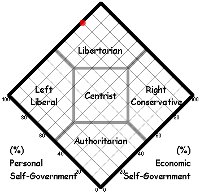| Wednesday, December 25, 2002 |
| Corporations Are Not People |
First Local Government in the United States Refuses to Recognize Corporate Claims to Civil Rights: Bans Corporate Involvement in Governing.On the evening of December 9, 2002, the elected municipal officials of Porter Township, Clarion County -- a municipality of 1,500 residents an hour north of Pittsburgh in Northwestern Pennsylvania -- became the first local government in the United States to eliminate corporate claims to civil and constitutional privileges. The Township adopted a binding law declaring that corporations operating in the Township may not wield legal privileges - historically used by corporations to override democratic decisionmaking -- to stop the Township from passing laws which protect residents from toxic sewage sludge.From Ending Corporate Governanance. Found at wood s lot [ Politics | 2002-12-25 00:33 | 0 comments | PermaLink ] |
| Abolish Corporations |
 The biggest obstacle blocking the emergence of a free and peaceful world is in my opinion the legal concept of a corporation. It is, in principle, very easily removed, as it is only a legal fiction in the first place, and not any naturally occuring 'god-given' phenomenon or right. Corporations only exist because there are laws saying that they can. In practice it will be very hard to change, exactly because the current corporations can put vast resources to use in protecting and expanding their own power. The biggest obstacle blocking the emergence of a free and peaceful world is in my opinion the legal concept of a corporation. It is, in principle, very easily removed, as it is only a legal fiction in the first place, and not any naturally occuring 'god-given' phenomenon or right. Corporations only exist because there are laws saying that they can. In practice it will be very hard to change, exactly because the current corporations can put vast resources to use in protecting and expanding their own power.
People should certainly be able to organize themselves and operate as a group or organization. But a corporation is something else. A corporation is allowed the rights of a natural person. However, it has responsibilities and liabilities less than a natural person. And it can live eternally. These things can be useful and sensible when it is a small group of people who are trying to operate a business activity together. The initial people don't have to be too worried about being personally liable for the potential failure of the business, and the business can open a bank account for itself, and it can be continued even if the original participants drop out for some reason. But when it grows bigger, there are certain key design features that start to become prevalent. A corporation is controlled by very few people, but the fuel is provided by a great many people, in the form of investments and manpower. A large corporation might have the will of one person, carrying out one person's plans, and it has the legal right to act in most arenas as one legal person, but it might have the manpower of 100,000 people, and available resources bigger than those of a small country. All in the hands of a handful of people who don't have any personal liability for what the corporation does. It is very difficult to successfully convey what a horribly bad idea that is. Most of us are so used to the idea of corporations, and most of us have bought the propaganda that they're inextricably linked to free markets. Nothing could be further from the truth. Large multi-national corporations are the anti-thesis of free markets. They are the communist revolution you never even noticed happening. [ Politics | 2002-12-25 03:26 | 4 comments | PermaLink ] More > |
| Libertarians |
 I sort of considered myself libertarian. But then there is this libertarian who was running for office somewhere and who for some reason was e-mailing me his various statements and letters to the editor, etc. And when I finally got around to looking at them, I realized I disagreed with a lot of he was saying. Anti-environmentalist, pro-corporate kinds of views. When I wrote to him, to ask to get off his list, and I told him he sounded more like a religious right republican than a libertarian, he wrote back with some surprise, saying that he scored 100-100 on the libertarian quiz and that he agreed with 100% of the libertarian party platform. I sort of considered myself libertarian. But then there is this libertarian who was running for office somewhere and who for some reason was e-mailing me his various statements and letters to the editor, etc. And when I finally got around to looking at them, I realized I disagreed with a lot of he was saying. Anti-environmentalist, pro-corporate kinds of views. When I wrote to him, to ask to get off his list, and I told him he sounded more like a religious right republican than a libertarian, he wrote back with some surprise, saying that he scored 100-100 on the libertarian quiz and that he agreed with 100% of the libertarian party platform.
So, I figured I've better take that test and re-evaluate things a bit for myself. It is actually a rather good test, based on a more sensible political spectrum than the normal left-undecided-right thing. There are some important dimensions missing, which I'll get to in a moment, but it does make things more clear. The idea is that the Liberal Left wants people to be free when it comes to their personal behavior (but wants to control their money), and the Conservative Right wants people to be free when it comes to money (but want to control people's behavior and morals). An Authoritarian wants to control all of it, and a Libertarian wants people to be free both when it comes to money and personal morals. [ Politics | 2002-12-25 18:41 | 2 comments | PermaLink ] More > |